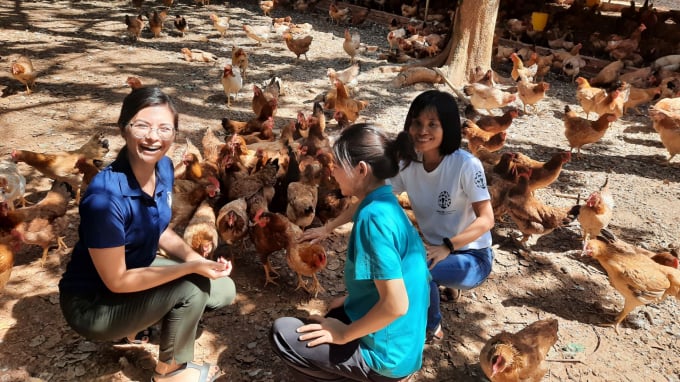November 24, 2025 | 10:50 GMT +7
November 24, 2025 | 10:50 GMT +7
Hotline: 0913.378.918
November 24, 2025 | 10:50 GMT +7
Hotline: 0913.378.918

The social enterprise worked with Humane Society International, a leading global animal protection organization, on the adoption of this policy. By working and supporting its farmer networks, HealthyFarm’s new policy will help to improve the lives of up to 10,000 hens this year. HeathyFarm will focus on growth and expansion in the years to come.
Established in 2016 in Danang, HealthyFarm is a social enterprise focusing on food sustainability including natural farming practices and upholding animal welfare. The enterprise seeks to protect public health while maintaining low environmental impact. HealthyFarm’s mission is to bring clean, safe and natural food to consumers while simultaneously supporting the local farmers and local communities.
After nearly five years of operation, HealthyFarm has distributed more than half a million free-range eggs to both wholesale and retail channels.
Starting from 2020, the social enterprise has been partnering with HSI and World Animal Protection to develop networks of small-scale producers from rural communities to fulfill its commitment to serve 100% cage-free eggs in its stores and to its business customers. This is one of HealthyFarm’s most dedicated projects as it matches the organization’s mission.
Additionally, HealthyFarm is planning several consumer engagement events to raise awareness about cage-free eggs and animal welfare across Vietnam.
Dr. Kasia Weina, founding partner and director of HealthyFarm, stated: “We are excited to take the next steps towards sustainable, responsible consumption that highlights ethical treatment of animals throughout our supply chain. We aim to pioneer this movement and continue to raise awareness and facilitate change surrounding this issue.”
Hang Le, corporate outreach manager for HSI/Vietnam, stated: “We applaud HealthyFarm for joining hundreds of food companies around the globe in pledging to source only cage-free eggs, and we invite other companies to do the same. Through commitments like these, consumers and the food industry in the country are sending a clear message: Immobilizing egg-laying hens in cages is unacceptable, and the days of not questioning how animals are treated in the food industry are long gone. The future of egg production is cage-free, and we look forward to continuing to work with HealthyFarm on the implementation of this policy.”
In Vietnam, the vast majority of egg-laying hens are confined in wire battery cages, where each hen has less space than an A4-sized sheet of paper to spend her entire life. Battery cages are inherently cruel — hens are unable to move freely or express important natural behaviour, including nesting, perching and dustbathing. Cage-free systems generally offer hens higher levels of animal welfare than battery cage systems.
HealthyFarm joins other multinational companies that have made similar global cage-free egg commitments that apply to Vietnam and the rest of Asia, including 4P’s Corporation, AccorHotels, Hilton Hotels and Resorts, Nestle, Sodexo and Mondelez International, among others.
/2025/11/22/4018-4-213342_747.jpg)
(VAN) The Mekong Delta Agricultural Experts Club has attracted 143 experts and researchers to participate in providing consultancy and contributing initiatives to the development of one million hectares of high-quality rice.

(VAN) Ca Mau’s development of OCOP products opens a path to increasing cooperatives value, helping boost income, expand markets, and affirm collective economy's role.

(VAN) Turning seemingly ordinary coconut shells into unique jewelry and artwork, Nguyen Bang Nhi spreads the value of local culture through her brand, Cocohand.

(VAN) Results from the Sustainable Durian Model Project in Dak Lak have confirmed the critical role of Yara Viet Nam in transferring advanced nutritional solutions to farmers.

(VAN) In Tuyen Quang province, livestock farmers have introduced effective models and innovative practices that significantly strengthen African Swine Fever prevention and control efforts.

(VAN) This is the study conducted by IRRI and Can Tho University on the rice straw value chain in Mekong Delta showing an economic potential of more than 6.6 trillion VND/year.

(VAN) By participating in cooperative economics, many farmers in Tay Ninh have overcome hardship, mastered clean dragon fruit cultivation techniques.